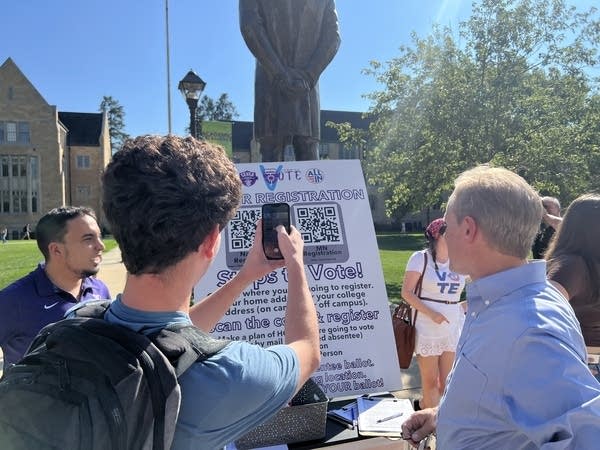Early voting starts for November election

Go Deeper.
Create an account or log in to save stories.
Like this?
Thanks for liking this story! We have added it to a list of your favorite stories.
Minnesotans whose minds are made up in this fall’s election can cast their ballots starting Friday.
Minnesota is tied for the longest early-voting period in the country. South Dakota also starts 46 days out, with a few other states just behind. Several more begin two to three weeks from Election Day. Others have no official early voting at all.
That duration of early voting is an issue in the campaign, with some candidates for election roles and other offices saying it lasts too long. People can request that an absentee ballot be sent to them or they can vote early in person at select locations.
DFL Secretary of State Steve Simon, who is running for a new term, said it’s worked well since Minnesota lengthened its window from 30 days to 46 days in 2010.
Turn Up Your Support
MPR News helps you turn down the noise and build shared understanding. Turn up your support for this public resource and keep trusted journalism accessible to all.
“We’ve got to keep our eyes on the voters — what is best for everyday eligible voters. And this has served them very, very well,” Simon said this week. “It's one of the reasons among many, that we enjoy such high turnout that we are right now the reigning national champs in voter turnout.”
Simon’s Republican opponent for the state’s top elections job is Kim Crockett. She said the window for early voting is open too long. Crockett didn’t respond to an interview request, but has made clear throughout her campaign that she believes six-plus weeks of voting puts too big of a strain on the system.
“Instead of 46 long days of ‘early voting,’ let’s return to a reasonable week or two before Election Day,” Crockett’s website reads.

Simon expects far fewer people to cast an early ballot in 2022 than two years ago. Then, amid pandemic concern, almost six in 10 votes were cast that way.
He vouches for the protections built into the system. And Simon disputes suggestions that mail or early voting is susceptible to large-scale fraud. People who request a ballot must provide personal information, such as a driver’s license number or a portion of a Social Security number.
“The reason we haven't seen examples of that is that the person who swipes the ballot would not only have to figure out which form of personal identification the person used, but would also have to forge their signature and a witness's signature,” Simon said. “That's why it's almost non-existent.”
Once the early ballots are sent back, they’re verified by election authorities through absentee ballot boards. People who vote early have until seven days before the election — Nov. 1 this year — to ask for a replacement ballot if they change their mind. After that, there’s no do-over.
The kickoff to early voting is just one sign the election is pulling within sight.
Earlier this week, the focus on college campuses and elsewhere was getting new voters signed up during National Registration Day.
At the University of St. Thomas, volunteers tried to stir up interest at their booth in the main courtyard as students moved between classes.
“Come on over. It’ll take three minutes. Do you have three minutes until class?” one volunteer said to passing students.
Occasionally, one stopped to snap a picture of a QR code leading to an online registration form or to fill out a paper copy.

Second-year political science major Maggie Sutton, who has been making the rounds on campus to drum up interest, said the voter registration efforts will soon shift to pushing the student body to actually vote. She said the early voting option is part of that.
“If you don't have a car on campus or you're from an area that's not close to the Twin Cities, we really stress the point of absentee voting — about how easy it is to vote absentee,” she said. “That way, you don't even have to worry about it.”
Those who want to wait will get other nudges, including a “donut forget to vote” sweets giveaway on the eve of Election Day.
Sutton knows younger people historically show up to vote at lower rates than other age groups and stresses to her peers that their participation is important.
“As people who are a part of this democracy we do deserve to have a say in the government,” she said. “And that as young people, we are going to have to live with the government the longest.”




